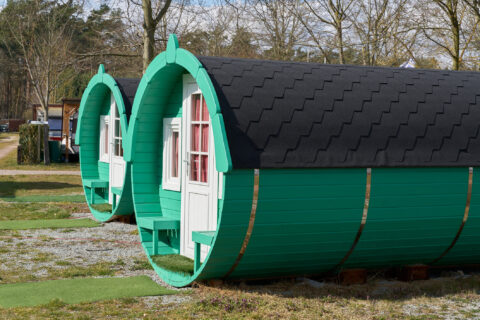Along with its rewards, the vacation rental business does come with risks. For both homeowners and property managers, the risks can jeopardize your business. Fortunately, vacation rental insurance provides protection against unexpected damages or accidents during a guest’s stay. However, not all policies are created equal, and finding the right one for your property can be overwhelming. In this article, we offer you information and insight to help you make an informed decision.
What is Vacation Rental Insurance
The reality of renting is that accidents and unexpected damage can occur during a guest’s stay. Imagine if a guest accidentally sets fire to your kitchen while trying to cook a meal, or slips and falls on a wet floor, injuring themselves. Without the right insurance, you could be facing significant financial losses. That’s where vacation rental insurance comes in! Providing coverage for damages and liability that could occur during a guest’s stay, vacation rental insurance gives you the peace of mind you need to focus on growing your business and providing a great guest experience. Whether you’re managing an extensive portfolio of properties or renting out your family vacation home, make sure you have the right insurance in place to protect your investment.
What does Vacation Rental Insurance cover?
Let’s take a look at what vacation rental insurance typically covers so that you can choose the best policy.
Structural Property Damage
Since structural damage to your vacation rental property can be expensive to repair, having the right insurance coverage is essential. Safely offers coverage of up to $1,000,000 for structural damage, including damage to windows, doors, floors, bathtubs, and built-in appliances. While accidental and intentional damages are covered, normal wear and tear and damage caused by acts of nature are typically not covered under vacation rental insurance policies. In those cases, a homeowners insurance policy will likely be needed for coverage.
Property Contents
Your vacation rental property is more than just a house; it’s a home filled with your belongings and amenities that help make your guests’ stay comfortable. Whether it’s bedding, electronics or kitchen appliances, property can be damaged or lost during a guest’s stay, leaving you with a financial burden. That’s why many vacation rental insurance policies provide coverage for property contents, allowing you to claim the replacement costs. Safely’s vacation rental insurance allows you to claim up to $10,000 for the replacement of damaged property contents and belongings, including items such as bedsheets or televisions. This coverage also includes acts of theft, which unfortunately can happen. To learn more about preventing stolen items, check out Safely’s 5 Need-to-Know Tips.
Your vacation rental property is not just a source of income. It’s a reflection of your hard work and investment. That’s why it’s crucial to fully understand what is and isn’t covered by your insurance policy.
Bodily Injury
If a guest were to be injured while staying at your property, you could be held liable. That’s why vacation rental insurance is crucial to protect your investment. With Safely, you can have peace of mind knowing that you’re covered for up to $1,000,000 in case of bodily injury to a guest. This coverage includes medical bills and related expenses, protecting you from potentially devastating financial losses.
It’s also important to minimize the potential for bodily injury by regularly checking and documenting that the infrastructure at your vacation rental is functional and safe. For more information on negligence situations and how to mitigate against liability, check out 3 Situations When a Vacation Rental Guest Can Sue the Host.
Guest Screening
With Airbnb and Vrbo more popular than ever, vacation rental property managers are under pressure to accept bookings quickly. But booking without proper screening can have dire consequences, such as damaged relationships with neighbors or damaged property. But don’t panic! There are ways to protect yourself and your property. In addition to vacation rental insurance, screening guests is critical to ensure that your guests are trustworthy and responsible. At Safely, guest screening is automatic, and it seamlessly integrates with some of the best-known property management software systems. The guest screening process only requires your guest’s name, date of birth and address in order to perform background checks, in which it scans county and court records and national and criminal databases, checks credit history information, and runs every guest through The List, Safely’s proprietary database of guests that have caused damage to vacation rentals in the past. The host will receive a risk score for each reservation in order to make an informed decision whether to allow the guest into their home. If the host decides to cancel a reservation based on a screening, they’ll be protected from legal recourse since Safely follows the Fair Credit Reporting Act (FCRA).
As a Property Manager, do I Need Vacation Rental Insurance?
For property managers, homeowner trust is vital to growing a short-term rental management portfolio. Homeowners trust you to keep their properties safe and secure, but unforeseen events can arise and cause significant financial losses. Understanding the risks that come with managing short-term rental properties can help you take action to protect yourself, the homeowner and the guest. With Safely, you get not only the coverage your business deserves but also the protection your property owners can depend on.
Remember, under-insuring your vacation rental properties can leave you vulnerable to expensive property damage and personal liability claims, resulting in the potential loss of your short-term rental property business. Instead, obtaining the right insurance coverage from a specialized insurance company such as Safely will protect you and your business interests from a potential nightmare scenario. For more tips on getting the right coverage for your second home, check out our article on vacation home insurance.
By investing in the right insurance coverage, you can protect yourself, your business, and your clients against financial loss resulting from unexpected incidents.
What About Vacation Rental Liability Waivers?
A vacation rental liability waiver is an agreement between a guest and a vacation rental owner or property manager in which the guest waives the right to claim against the owner/manager in court in the event of bodily injury or property damage. While meant to protect the property owner from legal action, such waivers may not always hold up in court and may not cover all potential risks. For more, see Why a Vacation Rental Liability Waiver Leaves You Vulnerable.
Or Vacation Rental Security Deposits?
Vacation rental security deposits can offer peace of mind to property owners, as they are intended to cover potential damage caused by guests during their stay. These deposits, usually a percentage of the reservation fee or a fixed amount, are refunded if the property is left undamaged. However, having to collect security deposits can sometimes create tension during the reservation process and may lead to lower booking rates. Also, security deposits may not cover all damages caused by guests, which can leave the host with additional expenses. Hosts should carefully consider the benefits and drawbacks of security deposits before including them in rental policies. To learn more about security deposits, check out The Problem with Vacation Rental Security Deposits.
And What About Vacation Rental Damage Waivers?
A damage waiver fee is a non-refundable payment made by the guest which covers minor, accidental damage. For example, let’s say your guests accidentally spill red wine on your carpet. With a damage waiver in place, you know that you’re covered for the cost of cleaning or replacement. Without it, you’d be stuck with the bill yourself.
While guests may not love the idea of paying a damage waiver fee upfront, it’s important to present it as just another part of the rental cost.
If you’re considering a damage waiver for your vacation rental, there are pros and cons to weigh. One advantage is that it’s typically a lower amount than a security deposit, so guests can avoid having funds tied up during their stay. However, since these fees are non-refundable some guests may be deterred from booking. The fees also don’t cover intentional damage or lost and stolen items. For more on this, check out Vacation Rental Damage Waivers: Pros, Cons, and Alternatives.
As a Homeowner, do I Need Vacation Rental Insurance?
As a homeowner, if you plan to rent out your property as a short-term vacation rental, you very likely need specialized vacation rental insurance to protect your investment.
Doesn’t Homeowners Insurance Cover Vacation Rentals?
Homeowners insurance policies typically don’t cover the unique risks associated with short-term rental properties since insurance companies consider short-term rental activities a business function, and may even expressly exclude vacation rental homes from coverage. Without appropriate insurance coverage, you could be vulnerable to expensive property damage and personal liability claims.
Don’t Booking Platforms Offer Free Vacation Rental Insurance?
Booking platforms like Airbnb and Vrbo offer a type of free vacation rental protection for property owners. Airbnb’s AirCover offers hosts up to $1,000,000 in coverage for third-party claims of personal injury and up to $3,000,000 in damage protection. Vrbo provides $1,000,000 in liability insurance for homeowners and property managers. While these policies can offer some protection, they should not be depended upon. For instance, Airbnb’s host protection only covers damage caused by guests, not damage from other sources, and according to Airbnb, it should not be used as a substitute for insurance.
Safely Vacation Rental Insurance – A Smart Investment for Your Property and Your Guests
Specialized insurance is going to be the best option for anyone serious about growing their business and protecting their property and investment.
At Safely, our policies are designed to provide property managers and homeowners peace of mind while ensuring that guests are also protected. We understand the importance of providing a seamless claims process and timely payouts. Plus, our policies don’t have any hidden exclusions in the fine print. And with our guest screening tool, you can feel confident that your guests are trustworthy and responsible.
Don’t take unnecessary risks with your investment – make sure you have the right insurance in place to protect it. Get in touch with Safely today!
Vacation Rental Insurance FAQs
Property Managers
What type of insurance does a short-term rental property manager need?
A short-term rental property manager should have vacation rental insurance to protect their investment and their clients against financial loss resulting from unexpected incidents. Homeowners insurance policies typically do not cover the unique risks associated with short-term rental properties. While booking platforms such as Airbnb and Vrbo offer some free vacation rental coverage, it is recommended to get a specialized insurance policy like the one offered by Safely, which provides extensive coverage, including structural damage, property contents, bodily injury, and a guest screening tool.
Why shouldn’t a property manager self-insure their vacation rental?
Self-insuring a vacation rental property can leave property managers vulnerable to expensive property damage and personal liability claims, potentially resulting in the loss of their short-term rental property business. It’s important for property managers to obtain the right insurance coverage from a specialized insurance company to protect their business and their clients from financial loss.
Homeowners
Do I need vacation rental insurance if I already have homeowners insurance?
Yes, as a homeowner renting out your property as a short-term vacation rental, you will likely need specialized vacation rental insurance to protect your investment. Homeowners insurance policies typically don’t cover the unique risks associated with short-term rental properties, as insurance companies generally consider short-term rentals a business activity and may even specifically exclude vacation rental homes from coverage. Without appropriate insurance coverage, you could be left with expensive property damage and personal liability claims.
Does my vacation rental insurance replace my homeowners insurance?
No, vacation rental insurance does not replace homeowners insurance. Homeowners insurance is still needed to provide comprehensive coverage for the homeowner’s primary residence and personal belongings.







